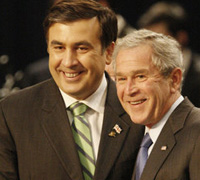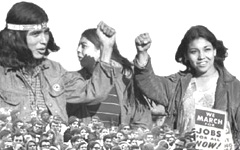
Month: August 2008


Communication Breakdown: How Cell Phones Hurt Communities
It was a fresh morning after a night of rain and we were hiking up into the mountains in Southern France. The plants and trees glowed with green, vibrant life. Sheep and cows were meandering in the fields, and the sky was blue, stretching out for miles. Then I heard a faint beeping noise that didn't sound like a bird.

The Freedom Archives: An Interview with Claude Marks
Claude Marks is the director of The Freedom Archives, a San Francisco-based organization. Through the website and email list-serves, Freedom Archives provide a valuable resource documenting both revolutionary struggle and police state repression. Freedom Archives also creates high quality audio and video documentaries, including the recent video about the San Fransisco 8, titled "Legacy of Torture."

Open Forum: Discussing Solzhenitsyn’s Life and Politics
After the August 6th publication of Alexander Solzhenitsyn: ‘Let us change our course!’ on Toward Freedom, TF board members and advisors began an interesting and productive discussion regarding Solzhenitsyn’s life and political views. Solzhenitsyn is a controversial and complex figure, and under discussion was to what extent he can be claimed by progressives and the peace movement given that he was a supporter of the Cold War.
To offer alternative viewpoints on Solzhenitsyn’s life and times, we have provided a list of links to other articles and videos. Please check back for updates to this list and forum. If you would like your comments to be added here, or would like to suggest another resource on Solzhenitsyn’s life, email [email protected]

Alexander Solzhenitsyn: ‘Let us change our course!’
I want to push through
To the very essence of everything:
Straight to the core of days gone by,
To what made them,
To the foundations, to the roots,
The heart of the matter.
– Boris Pasternak
The Russian author Alexander Solzhenitsyn, who died on August 3, 2008, wrote in his most autobiographical novel The First Circle, that "A great writer is, so to speak, a second government. That is why no regime anywhere has ever loved its great writers, only its minor ones." The writer as the conscience of the people has a long tradition in Russia both in Czarist and Soviet times. Turgenev was compelled to live much of his life abroad, and many of his works were suppressed. Chekhov felt this duty of public conscience so strongly that, even though suffering from tuberculosis, he insisted on making a long journey to the Sakhalin Islands to report on the conditions of exiles there. Leo Tolstoy was regularly censored and finally excommunicated by the Russian Orthodox Church which banned any prayers at his funeral.

